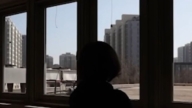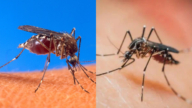【新唐人2011年10月16日讯】贵州省一所小学被发现给学生霉烂食物当午餐,引发近千人堵路抗议。大陆学校利用“黑心食堂”牟利的现象,已经不是单一的问题。有民众质问,政府说孩子是祖国的未来,却给他们连猪都不能吃的烂菜,中国的未来到底在哪里?
10月13号早上,贵州省遵义市东风小学家长发现,一车给孩子们做午餐用的材料,白菜青椒已经腐烂流着液体﹔茄子已经打蔫﹔白菜最表层全是菜梆烂叶﹔猪肉是槽头肉。家长们愤怒不已,将这些烂菜搬到街道中间,大曝学校食堂黑心之举。
越来越多家长聚集在校门口,最后围观群众多达上千人,造成学校附近交通堵塞。当天直到下午1点30分,围观人群才散去。
有家长说,她的孩子已经一个礼拜吃不下饭,有恶心反应,天天拉肚子。
东风小学家长:“这种做的恶劣的话,可能会食物中毒,影响小孩的身体健康。长时间吃的话会不会对这个小孩未来怎样,会不会带来其他疾病,或者大面积的食物中毒,或者有很多不堪想像的事情发生,或者都能够影响小孩的终身的。”
据了解,东风小学食堂已经由私人承包四年,学生每月交148元,每天吃一顿中餐,算下来,每餐七元左右。
曾经担任教师的“民生观察”网站负责人刘飞跃指出,大陆很多学校都是从食堂方面赚取收入。
刘飞跃:“大陆的中小学,甚至大学和其他学校,学生食堂是一个学校很重要的收入,甚至是很主要的收入,学校有很多的经费,如老师的工资,都是靠食堂的收入,没有这个收入学校的运作可能就有问题。肯定学校对这种收入是多多益善,当然造成很多学校克扣,谋取更多利益,这是很普遍的现象。”
目前大陆媒体报导,东风小学校长喻荣堂已经被免职。
东风小学“黑心食堂”事件迅速在媒体和网上引起关注。有网友透露:“这种现像在广大的贵州中小学校是普遍存在的,用的油、食材在品质上都有一定问题,老师敢怒不敢言,悲哀啊!”
一网友表示:现在的政府和学校很可恨,天天说孩子是祖国的未来,天天喂不能喂猪的腐烂的菜,我不知道中国的未来在什么地方。
刘飞跃认为,归根究底,学校出现“黑心食堂”,主要是政府投入的教育资源不足。
根据联合国数统计,中国在确保人民受教育权利方面甚至不如非洲乌干达、加纳等穷国。根据国家统计局公布的数据计算,从2000年到2009年10年间,中国财政性教育经费支出占GDP的比例不到4%。而在2009年,中国的教育支出仅为8,033亿元,远远低于中共官员公车消费、公款吃喝、公费出国的“三公”消费1万4千亿元。
新唐人记者吴惟、萧宇综合报导。
School Food Poisoning Scandal Rocks China |
A primary school in Guizhou Province has been reportedly
serving rotten food to students for lunch.
News of the incident triggered massive street protests.
Schools in mainland China reap a profit by maintaining
“black heart cafeterias” is not an isolated problem.
People wonder if the present generation of
Chinese children is really the future of the country.
If they are being served food that pigs wouldn’t dare eat,
where on earth does China’s future lie?
On October 13, some Dongfeng Primary School
student’s parents discovered a truck full of rotten food,
which they believed was going to be served to the students.
The cabbages and green peppers were terribly rotten and smelly;
the eggplants were all withered, and the pork was bad quality.
Angry parents took the food off of the truck
and put it in the middle of the street to expose
the black hearted intention of the school’s cafeteria.
More and more parents gathered in front of the school gate.
Finally, thousands of people gathered, causing a traffic jam.
People did not leave until 1:30 p.m. that day.
One parent said that her child was suffering from nausea
and diarrhea and hasn’t been able to eat for a week.
Some parents of Dongfeng Primary School students said:
“If it gets worse, it could lead to food poisoning,
which would surely affect the children’s health.
If it is not stopped, it could affect the children of the future,
or develop other diseases as a result, or severe food poisoning.
Many things that we can’t bear to imagine could happen.
The effects could last a lifetime.”
It is believed that the Dongfeng cafeteria services
have been privately contracted for four years.
Students pay RMB 148 (US$23.20) per month for lunch,
or about RMB 7 (US$1.10) per meal.
Chairman of the Civil Rights and Livelihood Watch website
and former teacher, Liu Feiyue, pointed out that many schools
in mainland China earn money from cafeteria sales.
Liu: “Cafeterias are an important way for primary schools,
high schools, and even universities and other schools
in the mainland to earn money.
In many cases it is a school’s main source of income.”
Since schools have a lot of expenses, such as teachers’ salaries,
they all rely on cafeteria profits to keep them afloat.
Many schools would not make it without this extra income.
Schools think the more money they make, the better.
It is common for many schools to serve as small portions
of food as possible, thus reaping more profit..
According to mainland China media,
the principal of Dongfeng,Yu Rongtang has since been fired.
This black heart cafeteria event quickly caught the attention
of netizens and the media, with one netizen commenting:
“This phenomena is very common in primary and high schools
in Guizhou Province.
The cafeteria’s most food groups have quality control issues,
which is making the teachers very angry.
The fact that they dare not talk about their feelings
makes the whole situation very pathetic.”
One netizen said: “Both the government and schools are hateful.
They tell us everyday that children are the future of our country,
but they feed them rotten vegetables that a pig wouldn’t eat.
I don’t know where the future of China lies!”
Liu Feiyue believes that the leading cause is
the government’s lack of investment in education.
According to U.N. statistics, in the area of education,
China is worse off than some poor African countries,
such as Uganda and Ghana.
National Bureau of Statistics figures show that
from 2000- to 2009, China’s fiscal education expenditure was
less than 4 percent of the country’s GDP.
In 2009, China’s education expenditure
amounted to only RMB 803.3 billion (US$125.9 billion),
far below the RMB 1,400 billion (US$219.5 billion)
per Chinese Communist Party official’s public funds
for cars, entertainment, and traveling abroad.
NTD reporter Wu Wei and Xiao Yu






























